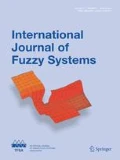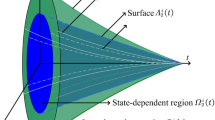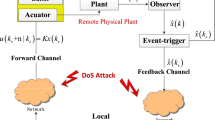Abstract
This paper is mainly concerned with event-triggered state estimation for Takagi–Sugeno (T–S) fuzzy neural networks subjected to stochastic cyber-attacks. An event-triggered scheme is utilized to decide whether the sampled data should be delivered or not. By taking the influence of the cyber-attacks into consideration, a T–S fuzzy model for the state estimation of neural networks is established with the event-triggered scheme. Through the utilization of Lyapunov stability theory and linear matrix inequality (LMI) techniques, the sufficient conditions are derived which can ensure the stability of estimator error systems. In addition, the gains of the estimator are acquired in the form of LMIs. Finally, a simulated example is presented to illustrate the effectiveness of the proposed method.






Similar content being viewed by others
References
Tsai, C., Wu, H., Tai, F., Chen, Y.: Distributed consensus formation control with collision and obstacle avoidance for uncertain networked omnidirectional multi-robot systems using fuzzy wavelet neural networks. Int. J. Fuzzy Syst. 19(5), 1375–1391 (2017)
Niu, B., Wang, D., Alotaibi, N. D., Alsaadi, F. E.: Adaptive neural state-feedback tracking control of stochastic nonlinear switched systems: An average dwell-time method. IEEE Trans. Neural Netw. Learn. Syst. (2018). https://doi.org/10.1109/TNNLS.2018.2860944
Wang, Y., Chien, C., Chi, R., Hou, Z.: A fuzzy-neural adaptive terminal iterative learning control for fed-batch fermentation processes. Int. J. Fuzzy Syst. 17(3), 423–433 (2015)
Niu, B., Li, H., Zhang, Z., Li, J., Hayat, T., Alsaadi, F. E.: Adaptive neural-network-based dynamic surface control for stochastic interconnected nonlinear nonstrict-feedback systems with dead zone. IEEE Trans. Syst. Man Cybern. Syst. (2018). https://doi.org/10.1109/TSMC.2018.2866519
Fan, D., Wang, Z., Wang, Q.: Optimal control of directional deep brain stimulation in the parkinsonian neuronal network. Commun. Nonlinear Sci. Numer. Simul. 36, 219–237 (2016)
Xu, Q., Yang, Y., Zhang, C., Zhang, L.: Deep convolutional neural network-based autonomous marine vehicle maneuver. Int. J. Fuzzy Syst. 20(2), 687–699 (2018)
Xu, B., Liu, Q.: Iterative projection based sparse reconstruction for face recognition. Neurocomputing 284, 99–106 (2018)
Zhao, J., Lin, C.: An interval-valued fuzzy cerebellar model neural network based on intuitionistic fuzzy sets. Int. J. Fuzzy Syst. 19(3), 881–894 (2017)
Chang, J., Wang, R., Wang, W., Huang, C.: Implementation of an object-grasping robot arm using stereo vision measurement and fuzzy control. Int. J. Fuzzy Syst. 17(2), 193–205 (2015)
Liu, J., Tang, J., Fei, S.: Event-triggered \({H_\infty }\) filter design for delayed neural network with quantization. Neural Netw. 82, 39–48 (2016)
Lee, C., Lee, Y., Lin, C.: Nonlinear systems identification and control using uncertain rule-based fuzzy neural systems with stable learning mechanism. Int. J. Fuzzy Syst. 19(2), 470–488 (2017)
Xu, C., Zhang, Q., Wu, Y.: Existence and exponential stability of periodic solution to fuzzy cellular neural networks with distributed delays. Int. J. Fuzzy Syst. 18(1), 41–51 (2016)
Zheng, M., Li, L., Peng, H., Xiao, J., Yang, Y., Zhang, Y., Zhao, H.: Finite-time stability and synchronization of memristor-based fractional-order fuzzy cellular neural networks. Commun. Nonlinear Sci. Numer. Simul. 59, 272–291 (2018)
Liu, J., Wei, L., Xie, X., Yue, D.: Distributed event-triggered state estimators design for networked sensor systems with deception attacks. IET Control Theory Appl. (2018). https://doi.org/10.1049/iet-cta.2018.5868
Juang, C., Hsieh, C.: A locally recurrent fuzzy neural network with support vector regression for dynamic-system modeling. IEEE Trans. Fuzzy Syst. 18(2), 261–273 (2010)
Liu, J., Xia, J., Tian, E., Fei, S.: Hybrid-driven-based \(H_\infty \) filter design for neural networks subject to deception attacks. Appl. Math. Comput. 320, 158–174 (2018)
Liu, Y., Wang, T., Chen, M., Shen, H., Wang, Y., Duan, D.: Dissipativity-based state estimation of delayed static neural networks. Neurocomputing 247, 137–143 (2017)
Huang, H., Huang, T., Chen, X.: Reduced-order state estimation of delayed recurrent neural networks. Neural Netw. 98, 59–64 (2018)
Liu, J., Xia, J., Cao, J., Tian, E.: Quantized state estimation for neural networks with cyber attacks and hybrid triggered communication scheme. Neurocomputing 291, 35–49 (2018)
Liu, J., Wei, L., Cao, J., Fei, S.: Hybrid-driven \({H_\infty }\) filter design for T-S fuzzy systems with quantization. Nonlinear Anal. Hybrid Syst. 31, 135–152 (2019)
Chen, J., Xu, S., Ma, Q., Zhuang, G.: Relaxed stability conditions for discrete-time T–S fuzzy systems via double homogeneous polynomial approach. Int. J. Fuzzy Syst. 20(3), 741–749 (2018)
Qiao, L., Yang, Y.: Fault-tolerant control for T–S fuzzy systems with sensor faults: application to a ship propulsion system. J. Frankl. Inst. 355(12), 4854–4872 (2018)
Peng, C., Wen, L., Yang, J.: On delay-dependent robust stability criteria for uncertain T–S fuzzy systems with interval time-varying delay. Int. J. Fuzzy Syst. 13(1), 35–44 (2011)
Liang, H., Zhang, L., Karimi, H. R., Zhou, Q.: Fault estimation for a class of nonlinear semi-Markovian jump systems with partly unknown transition rates and output quantization. Int. J. Robust Nonlinear Control. (2018). https://doi.org/10.1002/rnc.4353
Zhang, Z., Zhou, Q., Wu, C., Li, H.: Dissipativity-based reliable interval type-2 fuzzy filter design for uncertain nonlinear systems. Int. J. Fuzzy Syst. 20(2), 390–402 (2018)
Zhang, Y., Tao, G., Chen, M., Wen, L.: Parameterization and adaptive control of multivariable noncanonical T–S fuzzy systems. IEEE Trans. Fuzzy Syst. 25(1), 156–171 (2017)
Gao, M., Sheng, L., Zhou, D., Niu, Y.: Event-based fault detection for T–S fuzzy systems with packet dropouts and (x, v)-dependent noises. Signal Process. 138, 211–219 (2017)
Xie, X., Yue, D., Zhu, X.: Further studies on control synthesis of discrete-time T–S fuzzy systems via augmented multi-indexed matrix approach. IEEE Trans. Cybern. 44(12), 2784–2791 (2014)
Wu, X., Wang, Y., Dang, X.: Robust adaptive sliding-mode control of condenser-cleaning mobile manipulator using fuzzy wavelet neural network. Fuzzy Sets Syst. 235, 62–82 (2014)
Mohammadzadeh, A., Ghaemi, S., Kaynak, O., Khanmohammadi, S.: Robust \(H_\infty \)-based synchronization of the fractional-order chaotic systems by using new self-evolving nonsingleton type-2 fuzzy neural networks. IEEE Trans. Fuzzy Syst. 24(6), 1544–1554 (2016)
Ali, M.S., Gunasekaran, N., Zhu, Q.: State estimation of T–S fuzzy delayed neural networks with Markovian jumping parameters using sampled-data control. Fuzzy Sets Syst. 306, 87–104 (2017)
Ali, M.S., Vadivel, R., Saravanakumar, R.: Design of robust reliable control for T–S fuzzy Markovian jumping delayed neutral type neural networks with probabilistic actuator faults and leakage delays: an event-triggered communication scheme. ISA Trans. 77, 30–48 (2018)
Yue, D., Tian, E., Han, Q.: A delay system method for designing event-triggered controllers of networked control systems. IEEE Trans. Autom. Control 58(2), 475–481 (2013)
Liu, J., Gu, Y., Xie, X., Yue, D., Park, J. H.: Hybrid-driven-based \(H_\infty \) control for networked cascade control systems with actuator saturations and stochastic cyber attacks. IEEE Trans. Syst. Man Cybern. Syst. (2018). https://doi.org/10.1109/TSMC.2018.2875484
Liu, J., Gu, Y., Cao, J., Fei, S.: Distributed event-triggered \(H_\infty \) filtering over sensor networks with sensor saturations and cyber-attacks. ISA Trans. 81, 63–75 (2018)
Choi, Y., Yoo, S.: Event-triggered decentralized adaptive fault-tolerant control of uncertain interconnected nonlinear systems with actuator failures. ISA Trans. 77, 77–89 (2018)
Xie, X., Zhou, Q., Yue, D., Li, H.: Relaxed control design of discrete-time Takagi–Sugeno fuzzy systems: an event-triggered real-time scheduling approach. IEEE Trans. Syst. Man Cybern. Syst. (2017). https://doi.org/10.1109/TSMC.2017.2737542
Liu, J., Zha, L., Cao, J., Fei, S.: Hybrid-driven-based stabilisation for networked control systems. IET Control Theory Appl. 10(17), 2279–2285 (2016)
Liu, J., Wei, L., Tian, E., Fei, S., Cao, J.: \(H_\infty \) filtering for networked systems with hybrid-triggered communication mechanism and stochastic cyber attacks. J. Frankl. Inst. 354(18), 8490–8512 (2017)
Liu, J., Zha, L., Xie, X., Tian, E.: Resilient observer-based control for networked nonlinear T–S fuzzy systems with hybrid-triggered scheme. Nonlinear Dyn. 91(3), 2049–2061 (2018)
Chen, X., Wang, Y., Hu, S.: Event-based robust stabilization of uncertain networked control systems under quantization and denial-of-service attacks. Inf. Sci. 459, 369–386 (2018)
Peng, C., Li, J., Fei, M.: Resilient event-triggering \(H_\infty \) load frequency control for multi-area power systems with energy-limited dos attacks. IEEE Trans. Power Syst. 32(5), 4110–4118 (2017)
Yang, W., Lei, L., Yang, C.: Event-based distributed state estimation under deception attack. Neurocomputing 270, 145–151 (2017)
Ding, D., Wei, G., Zhang, S., Liu, Y., Alsaadi, F.E.: On scheduling of deception attacks for discrete-time networked systems equipped with attack detectors. Neurocomputing 219, 99–106 (2017)
Peng, L., Cao, X., Shi, H., Sun, C.: Optimal jamming attack schedule for remote state estimation with two sensors. J. Frankl. Inst. (2018). https://doi.org/10.1016/j.jfranklin.2018.06.016
Liu, J., Wei, L., Xie, X., Tian, E., Fei, S.: Quantized stabilization for T–S fuzzy systems with hybrid-triggered mechanism and stochastic cyber-attacks. IEEE Trans. Fuzzy Syst. (2018). https://doi.org/10.1109/TFUZZ.2018.2849702
Ding, D., Wang, Z., Ho, D.W., Wei, G.: Observer-based event-triggering consensus control for multiagent systems with lossy sensors and cyber-attacks. IEEE Trans. Cybern. 47(8), 1936–1947 (2017)
Peng, C., Tian, E., Zhang, J., Du, D.: Decentralized event-triggering communication scheme for large-scale systems under network environments. Inf. Sci. 380, 132–144 (2017)
Zha, L., Tian, E., Xie, X., Gu, Z., Cao, J.: Decentralized event-triggered \(H_\infty \) control for neural networks subject to cyber-attacks. Inf. Sci. 457–458, 141–155 (2018)
Fridman, E., Shaked, U., Xie, L.: Robust \(H_\infty \) filtering of linear systems with time-varying delay. IEEE Trans. Autom. Control 48(1), 159–165 (2003)
Author information
Authors and Affiliations
Corresponding author
Additional information
This work was supported in part by the Open Fund of Key Laboratory of Grain Information Processing and Control of Hennan Province of China under Grant KFJJ-2018-203, and in part by the Natural Science Foundation of the Jiangsu Higher Education Institutions of China under Grant 18KJB120002, and in part by the Natural Science Foundation of Jiangsu Province of China under Grant BK20171481, and in part by National Key Research and Development Program of China (Project Nos. 2017YFD0401001, 2018YFD0401404), and in part by the Key Research and Development Program of Jiangsu Province (Project No. BE2016178).
Rights and permissions
About this article
Cite this article
Liu, J., Yin, T., Xie, X. et al. Event-Triggered State Estimation for T–S Fuzzy Neural Networks with Stochastic Cyber-Attacks. Int. J. Fuzzy Syst. 21, 532–544 (2019). https://doi.org/10.1007/s40815-018-0590-4
Received:
Revised:
Accepted:
Published:
Issue Date:
DOI: https://doi.org/10.1007/s40815-018-0590-4




